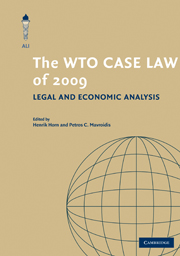Book contents
- Frontmatter
- Contents
- Foreword
- Introduction
- US Compliance with WTO Rulings on Zeroing in Anti-Dumping
- United States – Continued Existence and Application of Zeroing Methodology: the end of Zeroing?
- Incomplete Harmonization Contracts in International Economic Law: Report of the Panel, China – Measures Affecting the Protection and Enforcement of Intellectual Property Rights, WT/DS362/R, adopted 20 March 2009
- Comment
- Trading Cultures: Appellate Body Report on China–Audiovisuals
- Comment
- ‘Optimal’ Retaliation in the WTO – a commentary on the Upland Cotton Arbitration
United States – Continued Existence and Application of Zeroing Methodology: the end of Zeroing?
Published online by Cambridge University Press: 05 December 2011
- Frontmatter
- Contents
- Foreword
- Introduction
- US Compliance with WTO Rulings on Zeroing in Anti-Dumping
- United States – Continued Existence and Application of Zeroing Methodology: the end of Zeroing?
- Incomplete Harmonization Contracts in International Economic Law: Report of the Panel, China – Measures Affecting the Protection and Enforcement of Intellectual Property Rights, WT/DS362/R, adopted 20 March 2009
- Comment
- Trading Cultures: Appellate Body Report on China–Audiovisuals
- Comment
- ‘Optimal’ Retaliation in the WTO – a commentary on the Upland Cotton Arbitration
Summary
Abstract: This is the eighth Appellate Body Report in which some aspect of zeroing was adjudicated. As in the prior cases, the AB again found the US practice inconsistent with several aspects of the Anti-Dumping Agreement. The novelty in this dispute was the EC attempt to broaden the concept of what constitutes an appealable measure. The EC challenged whether a WTO decision regarding zeroing could apply to subsequent proceedings that might modify duty levels and asked the AB to decide whether the United States' continued use of zeroing in the context of a given case was consistent with WTO obligations. The AB stated that in its attempt to bring an effective resolution to the zeroing issue, the EC is entitled to frame the subject of its challenge in such a way as to bring the ongoing use of the zeroing methodology in these cases, under the scrutiny of WTO dispute settlement. The AB then cautiously applied the new perspective to US zeroing practice.
Introduction
United States – Continued Existence and Application of Zeroing Methodology is yet another dispute related to the US practice of zeroing in anti-dumping proceedings. As is well known to anyone familiar with WTO Appellate Body disputes, zeroing is the single most litigated subject in the history of the WTO. Indeed, this is the eighth Appellate Body (AB) Report in which some aspect of zeroing was adjudicated.
- Type
- Chapter
- Information
- The WTO Case Law of 2009Legal and Economic Analysis, pp. 45 - 62Publisher: Cambridge University PressPrint publication year: 2011
- 3
- Cited by

